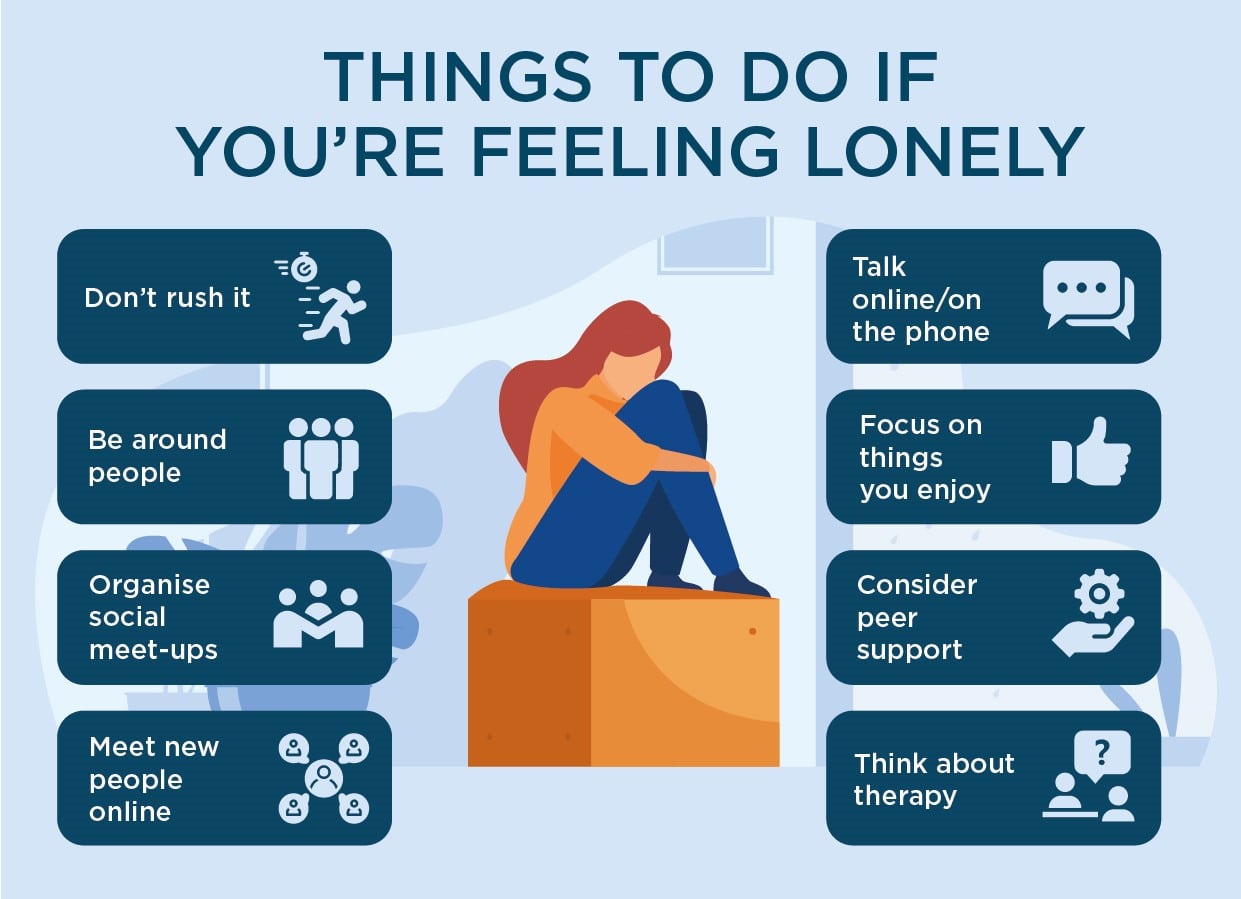How to cope with feeling lonely and depressed
Tips and advice from a leading therapist on overcoming loneliness and feelings of depression.
Tips and advice from a leading therapist on overcoming loneliness and feelings of depression.



If you're suffering from loneliness or feelings of depression, it's important to remember that this is something that you can overcome. You deserve to feel happy and fulfilled, and there are steps you can take to get there.
Here, we outline a few simple strategies to help you to cope with feelings of loneliness and continue to thrive. For people who are really struggling with extreme isolation, loneliness or symptoms of depression, we'll also talk you through the professional support and treatment that's available if you feel like you need a helping hand.
Loneliness and depression are closely linked, but they're not exactly the same. Depression is a diagnosable mental health condition characterised by persistent feeling of sadness. Loneliness is a subjective feeling of isolation, where our levels of social contact aren't as frequent as we want them to be. When a person is lonely and doesn’t take steps to address it, it can increase the likelihood of them experiencing depression and other mental health problems. When it comes to loneliness, a person will typically feel alone when the relationships in their life lack the intensity, intimacy and authenticity they need to feel content.
If you've been feeling lonely and isolated, know that it's something you can work to minimise. With some of the tips outlined in this piece, you can break the cycle of loneliness and depression and prevent these feelings from worsening over time.
There are a number of potential causes of loneliness, and often a collection of combining factors are at play. Some of these include physical isolation from other people, significant change in your life such as divorce or moving to a new location, or a stressful period in your life such as working long hours or an upcoming exam period.
The main causes of loneliness include:
There are also many reasons why people experience depression, many of which overlap with the causes of loneliness. These can include the following:
As feeling lonely and depressed are often interlinked, addressing one can often help the other. We understand that being proactive and taking on certain tasks can be incredibly challenging, but if you're able to push yourself, these self-care steps can be helpful.

During the moments when you're feeling lonely or depressed, write down your exact emotions and the reasons behind them. This can help in the following ways:
Within your thought journal, also write about when you feel happy and connected. Then, as you become more aware of what causes you to think and behave positively, start doing even more of the activities that make you feel good.
When you’re feeling lonely and depressed, you may find that you focus more on the negatives in life, which can leave you feeling even worse. One thing that you can do to change this is to write out a daily gratitude list, where you put down five things that you’re grateful for or happy about each day.
Giving yourself the time to focus on these positives will help you to become more aware of the good things you have and over time, this can help you to pay more attention to these positives as you go about your daily life.
When people feel lonely and depressed, they'll typically have low self-esteem too.
If you find that you constantly berate yourself for feeling down, think about what you’d say to a friend going through something like this and what you’d do to help them feel better. Rather than being self-critical, remember that you deserve compassion too, so treat yourself kindly in any moment when you aren’t feeling so good.
Written and narrated by Priory Therapist, Adele Burdon-Bailey, take 10 minutes from your day to ease symptoms of depression with this guided meditation.
Which people in your life make you feel great? Make regular plans with them and try really hard to maintain these relationships. These are the people who'll be able to support you and motivate you when you're feeling depressed. Even a regular phone or video chat can be a good way to connect.
We understand that being proactive and making plans to see and be around people can be hard when you’re feeling lonely and depressed. However, pushing yourself to spend more time with the people you care about can really help you to feel less alone.
If you feel that you aren’t satisfied with the social interactions in your life, think about what you can do to build more meaningful connections. What activities do you enjoy? Is there something new you want to try? Look into joining local groups or clubs to meet like-minded people who you can spend time with.
You may also want to look into getting professional therapeutic support. Many people who feel lonely and depressed find it useful to talk through what they’re experiencing with a therapist or counsellor, who they can then work with to find solutions for a better quality of life going forward.
If you've found that you continue to feel lonely and depressed regardless of any changes that you make to your lifestyle, you may need a helping hand in order to start feeling better.
You may want to start out by visiting your GP and explaining the thoughts and feelings that you've been experiencing. They can provide you with advice, support and if necessary, access to a service such as Priory where you can receive specialist support and treatment.
You can also come directly to Priory, where you'll be able to talk to one of our consultant psychiatrists to determine the best form of treatment or therapy for you to undergo at one of our hospitals or wellbeing centres. The mental health support and treatment that we provide includes weekly therapy sessions, day or half-day sessions at one of our day facilities, or residential support, depending on your needs.
If your feelings of loneliness and isolation are leading to severe symptoms of depression, to the extent that it's inhibiting your ability to live your life normally, then it might be time to consider reaching out for professional help.
Seeking specialist support for the difficulties you're having isn't a sign of weakness. There are plenty of options out there for you. Your first port of call might be to speak to your local GP, who can recommend treatments or next steps.
As an alternative, Priory offers outpatient, inpatient and day care treatment for depression, as well as online therapy. We will work closely with you to decide on the right direction for your recovery. Use the details below to get in touch with a mental health professional today and begin your journey to overcoming loneliness.
Get free monthly tips, tools and expert videos to support your mental health.
That's all in The Reset, helping you support your wellbeing - directly to your inbox each month.
